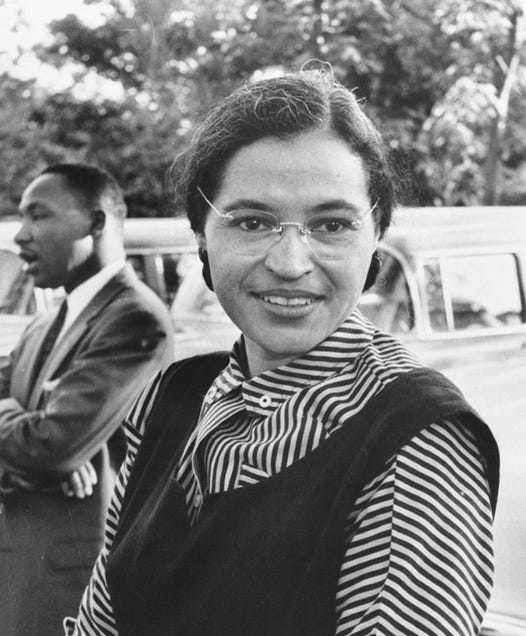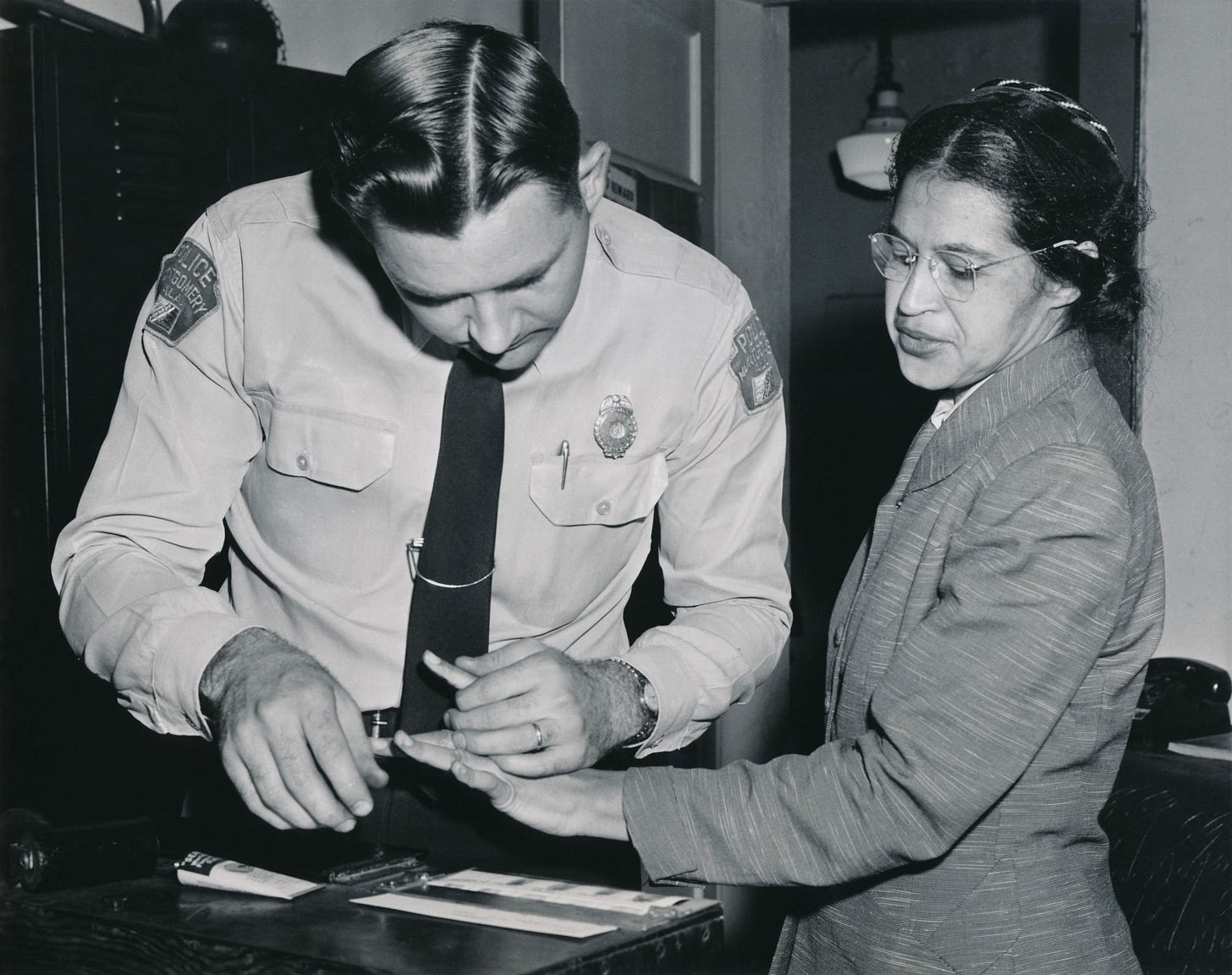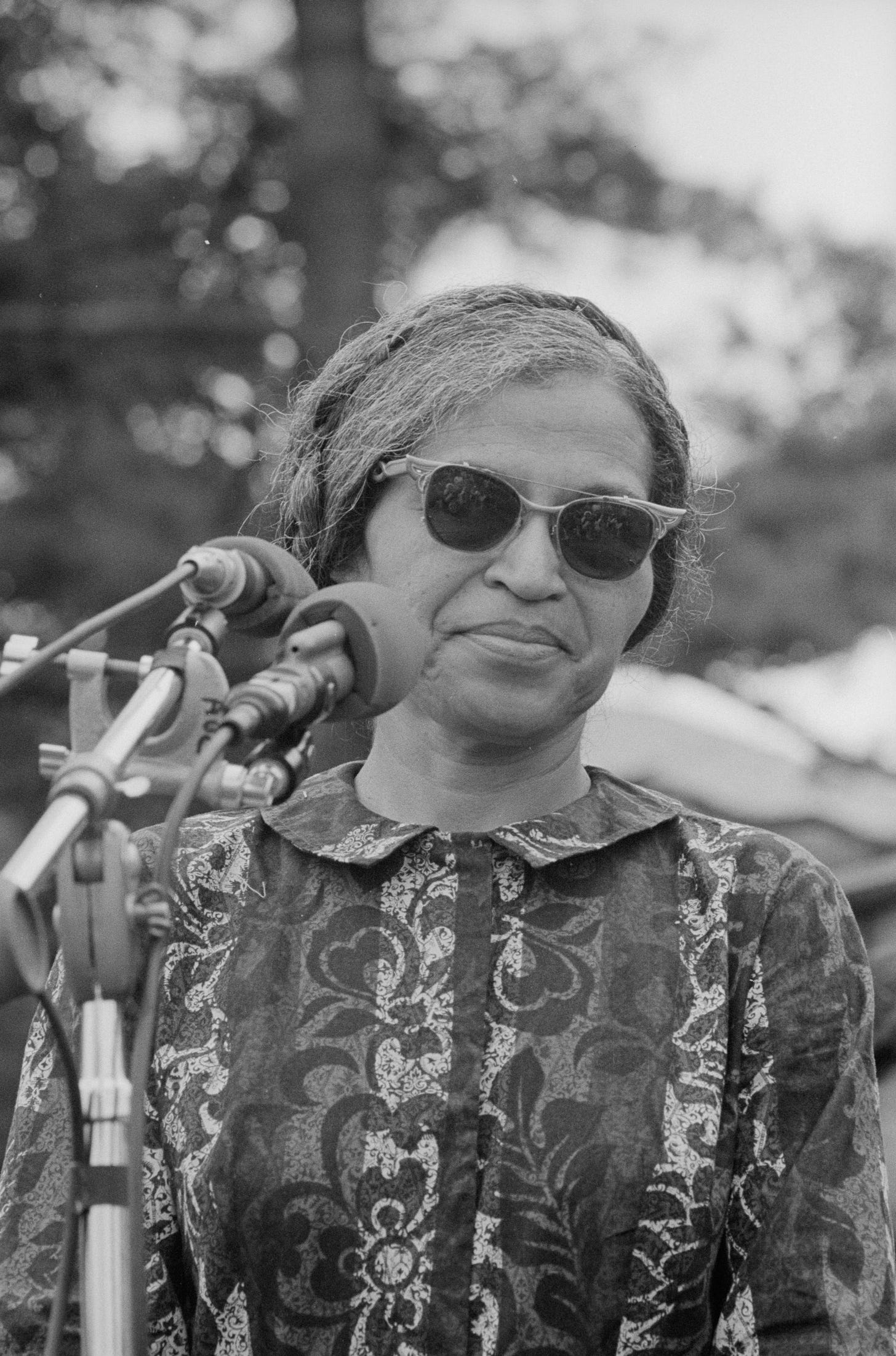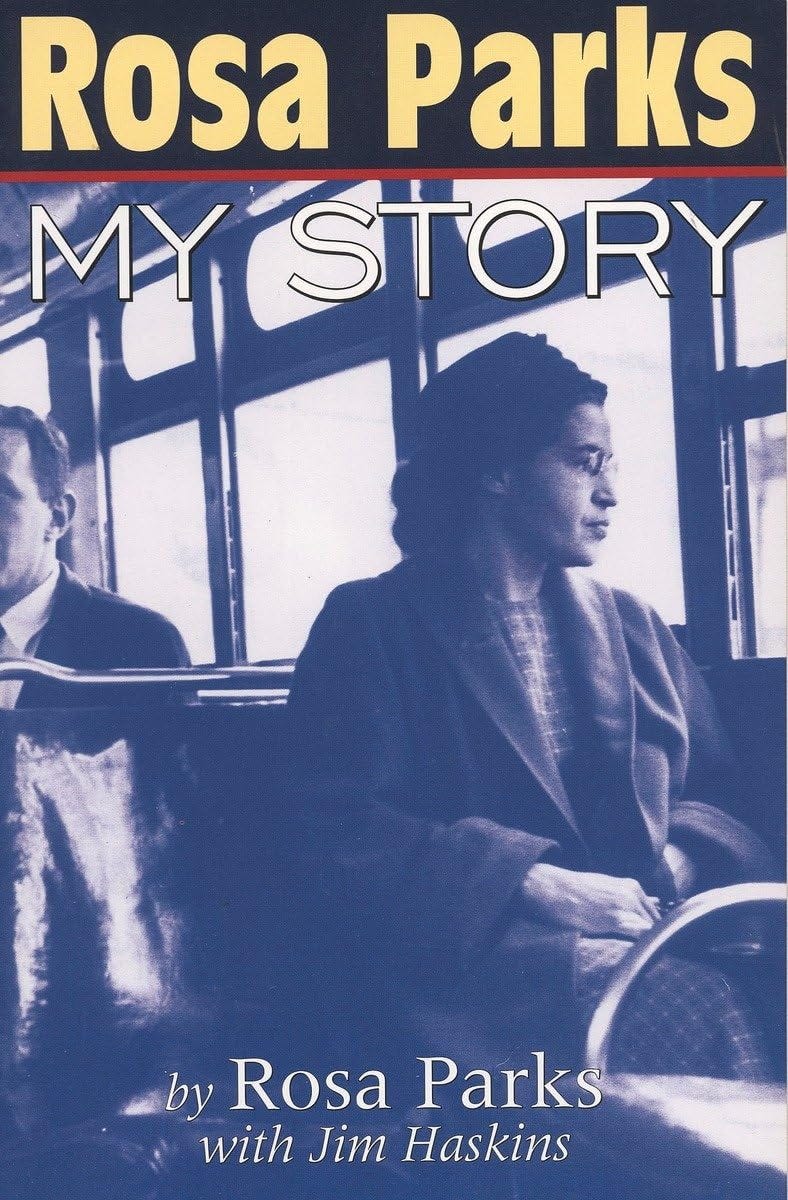On Thursday December 1st 1955, Rosa Parks was led into an empty dark cell in Montgomery, Alabama. The door slammed shut behind her. It was only moments ago when she had refused to give up her seat in a segregated bus.
''There are two girls around the other side, and if you want to go over there with them instead of being in a cell by yourself, I will take you there'', the matron told her. Parks responded it didn't matter. She felt resigned. The matron insisted, and took her to the other cell.
There were two African-American women in the other cell, one ignored Parks while the other asked what happened. She then stared sharing her own story. The man she was living with had struck her, so she took a hatchet and chased after him. He had her arrested. Although she had two brothers, she had not been able to get in touch with them. The only other person she knew was the man who assaulted her, and she did not want to be in contact with him. She was stuck in jail with no one to reach out to who could help. She'd been there for almost 60 days.
''I became interested in her story and wondered how I could assist her'', Parks thought.

Helping Others Helps You
Maybe the habit of protecting my little brother helped me learn to protect myself
Rosa Parks was born on February 4th, 1913 in Tuskegee Alabama. Growing up she was a sickly child and suffering from chronic tonsillitis had slowed her growth. She was delicate and quite small for her age. Around age 6 or 7, Parks had started work picking and chopping cotton in a nearby field. The workers had a saying that they ''worked from can to can't'', meaning they worked from when they could see with the sunrise, until they couldn't when the sun went down. Despite the hot sun and scorching ground, they usually didn't wear shoes. From this another expression emerged, ''Ain't nobody have shoes on but the hoss [horse] and the boss.''
Life for Rosa Parks, and other African-Americans during that period was unimaginably difficult. Despite her own struggles, Parks never thought twice about standing up for herself and others. She tells the story of when her grandma was going to punish her little brother by giving him a whipping, but she intervened saying, ''Grandma, don't whip brother. He's just a little baby and doesn't have no mama and no papa either.''
She was always very protective of her brother, getting whipped often for not telling on the things that he did.
Pushing Forward
At times I felt overwhelmed by all the violence and hatred, but there was nothing to do but keep going
Decades later in December 1943, Parks attended a meeting at the Montgomery branch of the NAACP, where she took up the job of secretary as a volunteer. At the time she was one of two women there. One of her main jobs there was to keep records of discrimination, unfair treatment or violence against African-Americans.
During this time she saw the extent of how bad things were, and how little recourse African-Americans had. ''We didn't have too many successes in getting justice. It was more a matter of trying to challenge the powers that be, and let it be known that we did not wish to continue being treated as second-class citizens.''
''You're Under Arrest''
Two policemen came. They got on the bus, and one of them asked me why I didn't stand up. I asked him, ''Why do you all push us around?'' He said to me, and I quote him exactly, ''I don't know, but the law is the law and you're under arrest.''
December 1st 1955 was just another regular day for Parks. She'd just got off from a busy day at work for the NAACP, and got on the Cleveland Avenue bus to head home. She sat in an empty seat in the middle of the bus, in the front seats of the Colored section.
The next stop was Empire Theatre, and the bus slowly filled up. Noticing that a white man was standing, the bus driver turned back and said, ''Let me have those front seats.''
Nobody moved.
He spoke again ''Y'all better make it light on yourselves and let me have those seats.''
Thinking back to the years of how she's been treated, Parks was finally tired of giving in. She remained seated. Noticing this, the driver asked her to stand up.
''No'', Parks replied.
''Well, I'm going to have you arrested.''
''You may do that.''

Helping Just One Person Matters
The one who spoke to me asked what had happened to me. I told her that I was arrested on the bus. She said, ''Some of those bus drivers sure are mean.''
After Parks had called her husband from the jail telephone, bail had been raised with the help of a friend. Meanwhile the women in the cell had found a piece of crumpled-up paper, where she wrote down the names and telephones numbers of her brothers. She told her to call them early in the morning, around 6 before they went to work. Parks said she would.
Just then, Parks was quickly rushed out of the cell before the woman could give her the paper. In a moment of quick thinking, the woman threw the paper down the stairs where it landed in front of her. Parks picked it up and put it in her pocket.
The first thing Parks did the morning after arriving from jail was to call the number that the women had written down. She was able to get in touch with one of the brothers and let him know what had happened to their sister.
Two days later, on her way on Dorsey Street to a meeting about boycotting the buses, she bumped into the woman. Parks didn't recognize her at first, as she was clean and dressed very nicely. Parks said, ''I'm glad to see you out''. As she was in a hurry, she forgot to ask for her name or number.
That was the only time she ever saw her.
The Importance of Putting Others First
Throughout her life, Rosa Parks displayed a characteristic that made her a true leader: the instinct to help someone else, regardless of her own circumstances.
When one thinks of a leader, the picture that often comes to mind is someone energetic and charismatic. A person who effortlessly addresses crowds of hundreds or thousands, and rallies them to push forward. One might think of Dr. Martin Luther King Jr.'s ''I Have a Dream'' speech on the steps of the Lincoln Memorial in Washington in 1963.
But Rosa Parks' story is mostly the opposite.
After her December 1st 1955 bus arrest became a public case, Parks was invited to a meeting at the Holt Street Baptist Church, where crowds had gathered to hear news about the ongoing Montgomery bus boycott. Dr. King had newly been elected as the president of the Montgomery Improvement Associated and gave a rousing speech, challenging the listeners to continue protesting for their rights.
Parks was then introduced to the crowd. She felt she ''didn't feel any particular need to speak,'' so instead she sat and listened to the others.
As the civil rights movement continued to grow over the years, another issue had yet to be addressed: equal voting rights. In protest of the racial injustice in voting, Dr. King called for and organized a series of mass marches from Selma to Montgomery from March 7 - 25th 1965. Initially starting with 600 people, by the third and final march the group had swelled to over 25,000 people.
Parks took part in those marches, but found herself being put on the sidelines and told she wasn't supposed to be there. She recalled, ''Whenever they would put me out, I would stand on the sidelines until somebody would pass by and say, ''Mrs Parks, come on and get in the march''.'' She would inevitably join in again and struggled through the crowd until they finally made it to the Alabama State Capitol.
Parks didn't make it about her. She was there to support a cause and did her part.

What's significant about all these moments is it shows that a leader doesn't have to be the one at the front and center. Leadership isn't just about being in charge of large groups of people. As can be seen throughout Parks' life, unostentatious acts and helping individuals can have just as strong an impact.
It's also important to highlight that when Parks was helping someone, things were usually bad for her. But a true leader doesn't give up on others when times are tough for them, they make it a case to put their issues aside and make sure others are looked after.
When Parks was sent to jail she had every right to be angry, to close inwardly and ignore the people around her. But she didn't. Instead her reaction was to help another woman in need. It didn't matter who she was, if anyone was watching, or if she'd ever see her again. What mattered was that someone needed help and she could help. That's all that mattered, her own problems did not.
That's why Rosa Parks' story is so remarkable. There's so much to learn about having upstanding character and being an unconventional leader.
Take this lesson to heart, regardless of where you are in life. If you're in a position of direct leadership or not, if someone needs help, put aside your own problems and do everything in your power to help.
You will have made a substantial difference, even if you're only helping a single person.
Details about the events, quotes and excerpts are from My Story, Rosa Parks' autobiography.

Thanks very much for reading!
If you have any feedback, ideas, suggestions, things I can improve, anything at all, please let me know!
Heck, if there’s something I can help you with, I’ll try my best!
Leave a comment below, reply to my notes, join the subscriber chat, reach out on Reddit or Bluesky, or send an E-mail!
I’m always happy to keep in touch :)
Please share this article if you enjoyed reading it!
And if you want to read more articles every week, you can subscribe here:
See ya next time!
Matthieu




